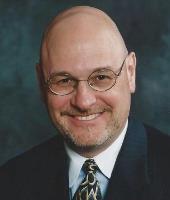
Born: April 25, 1954, in New York City. My family lived in the Bronx until I was 14, when we moved to Ridgefield, N.J.
Education: Earned an associate’s degree in accounting from Bergen Community College in 1975, a bachelor’s degree in accounting from William Paterson University in 1977, and a master’s degree in accounting from Fairleigh Dickinson University in 1979.
Family: Single father with two sons, Tristan (14), an eighth-grade student in St. Louis, and Michael (20), a sophomore at Rockhurst University in Kansas City, Mo.
Q: When and how did you enter the paper recycling industry?
A: While I was earning my associate’s degree, I worked at a publishing house and took its scrap paper for recycling to Bruno & D’Elia in Hackensack, N.J. That company hired me to work as a scale master on Saturdays and after school, weighing cars and trucks and closing the plant at night. That’s how I got into the recycling industry.
After earning my accounting degrees, I became an accountant for Bruno & D’Elia, which was bought by Garden State Paper. Then I became the controller for Bruno & D’Elia and Great Eastern Packing & Paper, both subsidiaries of Garden State.
Next, I moved to California and became controller for Garden State’s Pomona Newsprint mill. I was there for 10 years, and toward the end Jefferson Smurfit Corp.—which later became Smurfit Stone Corp.—acquired the company. A year later, I told the company I wasn’t interested in being an accountant anymore. An opportunity opened up to be a sales manager in Smurfit’s Philadelphia office, where I ran a small plant and covered the Northeast region. After six years there, Smurfit promoted me to national sales manager, based in St. Louis, and a few years later I became vice president of domestic sales for the company.
Rock-Tenn acquired Smurfit Stone, and I worked there for a short time. Then Graphic Packaging approached me and asked if I wanted to be director of secondary fiber. I accepted, and I’ve been here now for nine years.
Q: What was it about the industry that prompted you to build a career in it?
A: It was a good opportunity. In the mid-1970s, the job market was tough, so I was happy to get any job. I also found that I really liked the people in the business and how every day presented something new. I’ve built a lot of great relationships over the years, and that makes it fun doing business. That’s why I’ve stayed in the industry and plan to remain in it longer.
Q: What have been your most rewarding professional achievements?
A: I’m proud that I rose through the accounting ranks and successfully moved into the sales area. Not many people transition from accounting to sales in this business. Overall, I’ve done pretty much everything you can do in the paper recycling industry, so I guess you could say my achievement is my longevity.
Q: Personal achievements?
A: My father was an Italian immigrant who came to this country as a baby. Neither he nor my mother graduated from high school. They had to go to work. Given that family background, I’m proud I’ve been able to get where I am today in my career.
Q: What are you passionate about?
A: My boys—I love my two boys. They’re both good kids and talented athletes, and I’ve enjoyed coaching them in baseball and basketball. I also like to work out, watch sports, go to the movies with my sons, and listen to all kinds of music.
Q: Tell us something about you that would surprise people.
A: I worked with Special Olympics during my time in Philadelphia, which included coaching softball at a Special Olympics summer camp near Latrobe, Pa. Also, when I worked for Smurfit in St. Louis, I organized an annual golf outing to raise money for the American Cancer Society’s Hope Lodge.
Q: If you could improve anything about yourself, what would it be?
A: I wish my father had taught me to speak Italian. When my parents came over here, they wanted our family to assimilate and become American, so they didn’t teach us Italian. I’d also like to speak Spanish.
Q: When and why did Graphic Packaging decide to join ReMA and the PSI Chapter?
A: [PSI Chapter President] Leonard Zeid reached out to me about joining ReMA and PSI, so I took it to my company and said, “I think this is a good thing. We’re involved in AF&PA, but we can increase our involvement in the industry by joining ReMA and PSI as well.” The company saw the value, and it joined ReMA and PSI in 2018.
Q: What benefits have you received from your PSI involvement?
A: The benefit for me has been getting involved with the quality specifications and having a voice there. Graphic Packaging makes clay-coated boxboard for food products, and the quality of secondary fiber is paramount to our ability to make high-quality products for our customers. ReMA and PSI help us in that discussion.
Q: What are the major challenges facing your company and the overall paper recycling industry today?
A: Fiber quality is always a top concern for us. For years I’ve been fighting the idea that everything is recyclable. That simply is not true. So the biggest challenge is educating people about what they can recycle and what’s good to recycle. We’re always focused on encouraging people to recycle correctly to keep costs down for processors and allow mills to make quality products.